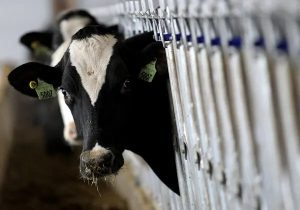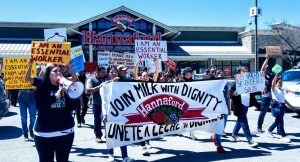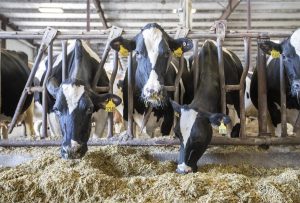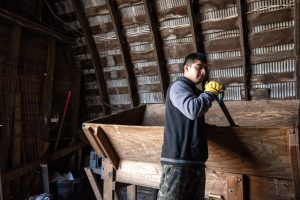
Work on these farms happens year-round, but there is no year-round agricultural visa, so tens of thousands of dairy workers exist in the shadows. Many live on the farms where they work, in housing provided by the farm, and there is no regular government oversight of the quality of that housing. North Country Public Radio’s Lucy Grindon reports.
LUCY GRINDON, BYLINE: About five years ago, a 17-year-old girl came to the U.S. from Guatemala to work with her brother on a dairy farm. When he showed her the tiny building where she’d be living with him and a few other workers, this was her reaction.
UNIDENTIFIED FARM WORKER: (Speaking Spanish)?
GRINDON: “I’m going to live in this house?”
Inside, what she experienced horrified her.
UNIDENTIFIED FARM WORKER: (Speaking Spanish).
GRINDON: Cockroaches, bedbugs that made her break out in hives. We’re not using her name because she’s not authorized to work in this country and fears being deported. When she lived on that farm, Marty Fefer and his wife would visit about twice a week to bring food and clothing.
MARTY FEFER: It was really more of a shed.
GRINDON: Fefer says insects and rodents were everywhere.
FEFER: I mean, so much so that you wouldn’t – you didn’t want to sit down.
GRINDON: The first night, there was no place for her to sleep. Her brother gave her his bed, and he slept on the floor, wrapped in sweaters to keep himself warm. She says it changed her perspective on this country. She remembers thinking…
UNIDENTIFIED FARM WORKER: (Speaking Spanish).
GRINDON: “This is the United States for us.”
She stayed there for about a year. Now she’s 23, and she’s in a better housing situation on another farm in New York. She’s been working in dairy for half a decade now. That whole time, she says no one from the government has ever come to inspect her housing. That’s not due to negligence or coincidence. In fact, there is no state or federal rule that requires regular inspections of the places where she’s lived. There is a visa program called H-2A for temporary agricultural workers. Federal law says H-2A housing has to be inspected annually, but dairy workers aren’t eligible because they’re not temporary workers. They work year-round. And New York law says health departments have to do annual inspections of temporary or seasonal farm worker housing, but they don’t have to inspect permanent farm worker housing.
Jessica Maxwell is the director of the Worker Center of Central New York, a worker advocacy group. She says the housing on dairy farms often has problems.
JESSICA MAXWELL: We do see a lot of issues with overcrowding. Some of the other common things we see are, you know, houses that aren’t weatherized appropriately.
GRINDON: Like any tenants, farm workers can complain to local health departments. But Maxwell says language barriers, lack of information and fear of deportation can get in the way. Rich Stup is an agricultural workforce specialist at Cornell. He says it’s pretty common for dairy farmers in the Northeast and the Midwest to provide employee housing.
RICH STUP: It’s certainly up to the farmer on how well they manage that facility and how good of a communication system that they have established with the residents in that facility.
GRINDON: A bill that passed the House last year could change that situation. It’s called the Farm Workforce Modernization Act, and it would expand the H-2A visa program to include year-round workers.
STEVE AMMERMAN: So their housing, too, would be inspected and subject to all the federal housing regulations.
GRINDON: That’s Steve Ammerman from the New York Farm Bureau, an agricultural lobbying organization. They support creating a year-round H-2A visa because it would increase the labor pool, but some worker advocacy groups oppose the bill. Emma Kreyche is an organizer with the Worker Justice Center of New York. She says a bigger H-2A program is not the answer because workers in the program have too little power.
EMMA KREYCHE: Workers are tied to a single employer and can be easily blacklisted and replaced if they speak out about any sort of violations or problems.
GRINDON: The bill that passed the House does include a pilot program for portable H-2A status, which would eventually allow some workers to move from one employer to another. Right now, the bill’s co-sponsors in the House are hoping that its Senate sponsors will introduce it for a vote soon. For NPR News, I’m Lucy Grindon in northern New York.






















